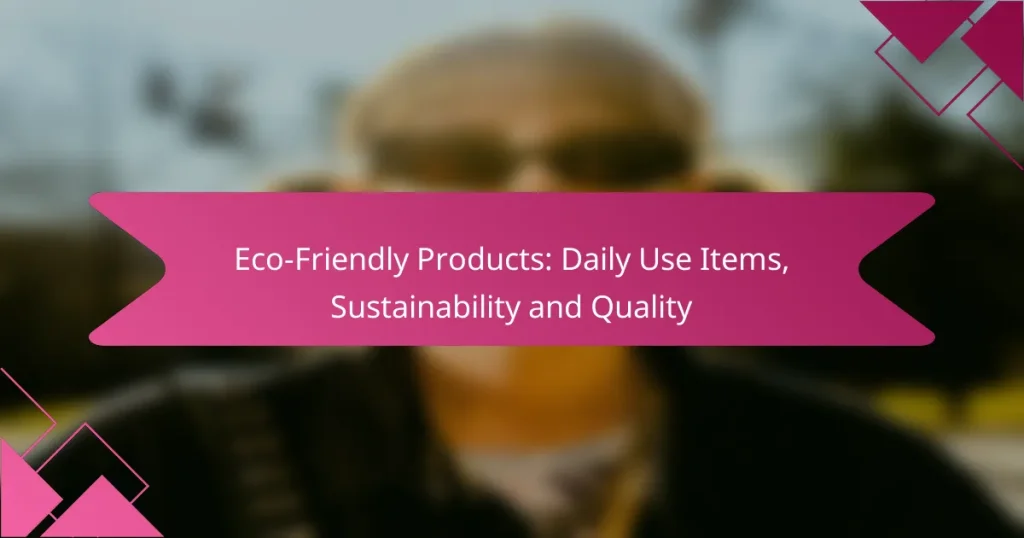Incorporating eco-friendly products into your daily routine is a powerful way to promote sustainability while enjoying high-quality items. From bamboo toothbrushes to reusable shopping bags, these products are designed to minimize environmental impact without sacrificing functionality. By choosing sustainable options, you contribute to reducing pollution and conserving resources, all while ensuring that your everyday essentials meet rigorous quality standards.
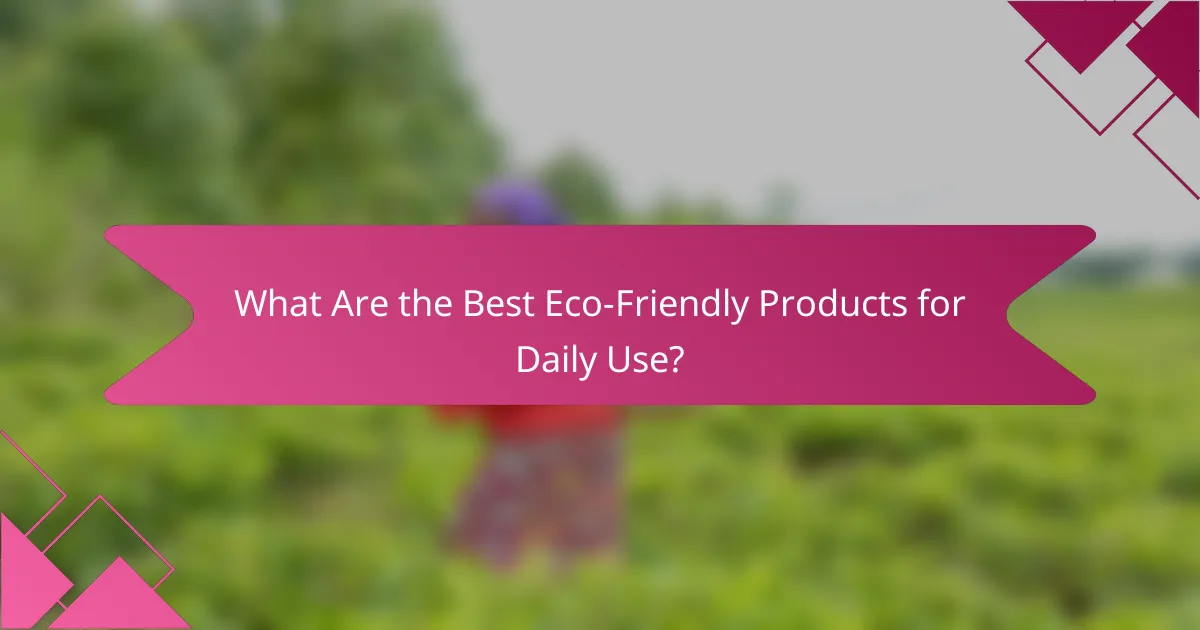
What Are the Best Eco-Friendly Products for Daily Use?
The best eco-friendly products for daily use are those that minimize environmental impact while maintaining functionality and quality. Items like bamboo toothbrushes, reusable shopping bags, biodegradable cleaning supplies, stainless steel water bottles, and organic cotton towels are excellent choices for sustainable living.
Bamboo Toothbrushes
Bamboo toothbrushes are a sustainable alternative to plastic toothbrushes, which contribute significantly to landfill waste. Made from biodegradable bamboo, these toothbrushes can decompose naturally, reducing plastic pollution.
When choosing a bamboo toothbrush, look for options with soft bristles made from plant-based materials. This ensures a gentle cleaning experience while remaining eco-friendly. Regularly replace your toothbrush every three months for optimal oral hygiene.
Reusable Shopping Bags
Reusable shopping bags are essential for reducing plastic waste generated from single-use bags. Made from materials like cotton, jute, or recycled plastics, these bags can be used multiple times, making them a practical choice for grocery shopping.
When selecting reusable bags, consider their size, durability, and ease of cleaning. Many bags are machine washable, which helps maintain hygiene. Always keep a few bags in your car or near your front door to avoid forgetting them during shopping trips.
Biodegradable Cleaning Supplies
Biodegradable cleaning supplies break down naturally and do not contribute to environmental pollution. These products often contain plant-based ingredients that are effective in cleaning while being safe for the planet.
Look for labels that specify biodegradable or environmentally friendly certifications. Common biodegradable options include dish soaps, laundry detergents, and surface cleaners. Using these products helps reduce harmful chemicals entering waterways.
Stainless Steel Water Bottles
Stainless steel water bottles are a durable and reusable alternative to single-use plastic bottles. They keep beverages cold or hot for extended periods and can last for years with proper care.
When choosing a stainless steel water bottle, consider its size, insulation capabilities, and whether it has a wide mouth for easy filling and cleaning. Avoid bottles with plastic linings to ensure they remain eco-friendly.
Organic Cotton Towels
Organic cotton towels are produced without harmful pesticides and chemicals, making them a healthier choice for both users and the environment. These towels are soft, absorbent, and biodegradable at the end of their life cycle.
When purchasing organic cotton towels, look for certifications such as GOTS (Global Organic Textile Standard) to ensure they meet organic farming standards. Regular washing and proper care will extend their lifespan while maintaining their quality.
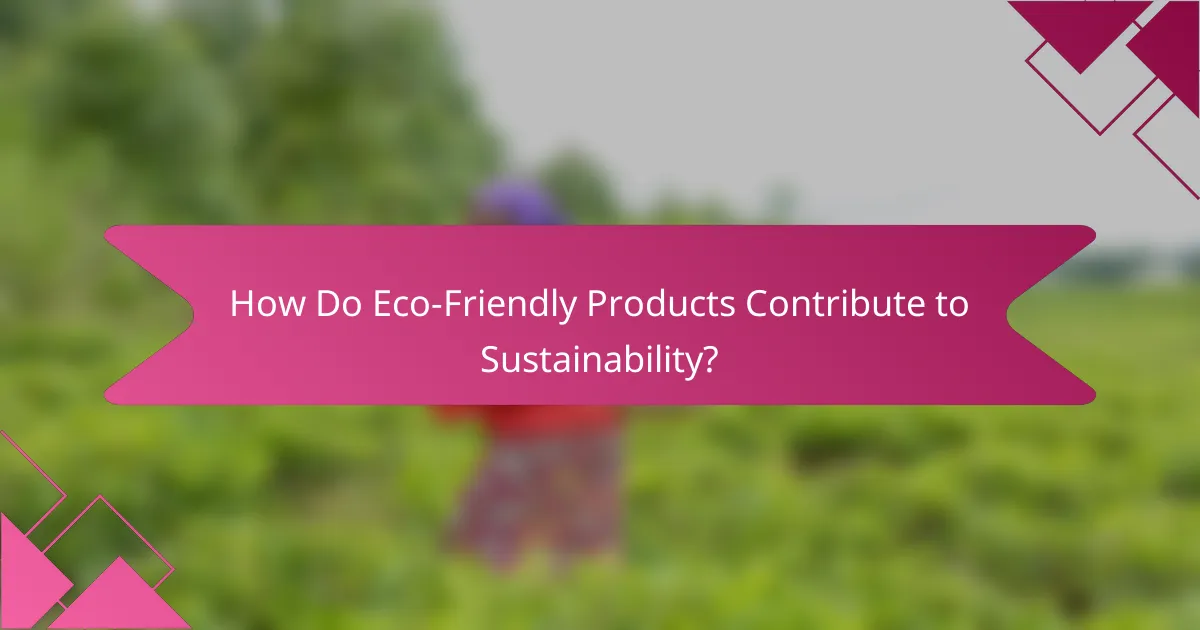
How Do Eco-Friendly Products Contribute to Sustainability?
Eco-friendly products play a vital role in promoting sustainability by minimizing environmental impact and conserving resources. By choosing these items, consumers can help reduce pollution, conserve energy, and support practices that protect the planet.
Reduction of Plastic Waste
Eco-friendly products significantly reduce plastic waste by utilizing biodegradable or recyclable materials. For instance, items made from bamboo, glass, or recycled paper can replace traditional plastic products, leading to less plastic in landfills and oceans.
When selecting eco-friendly alternatives, look for certifications like the Biodegradable Products Institute (BPI) label, which ensures that the product will break down safely in composting environments. This can help consumers make informed choices that align with waste reduction goals.
Lower Carbon Footprint
Using eco-friendly products contributes to a lower carbon footprint by minimizing greenhouse gas emissions during production and transportation. Products made from sustainable materials often require less energy to manufacture and can be sourced locally, reducing the need for long-distance shipping.
To further decrease your carbon footprint, consider purchasing items that are energy-efficient or made from renewable resources. For example, LED light bulbs consume significantly less energy compared to traditional incandescent bulbs, making them a smart choice for eco-conscious consumers.
Support for Sustainable Practices
Eco-friendly products often support sustainable practices by encouraging responsible sourcing and ethical production methods. Many brands prioritize fair labor practices and environmentally friendly materials, which helps create a more sustainable economy.
When shopping, look for brands that are transparent about their sourcing and production processes. Certifications such as Fair Trade or USDA Organic can guide consumers toward products that align with their values and promote sustainability in their communities.
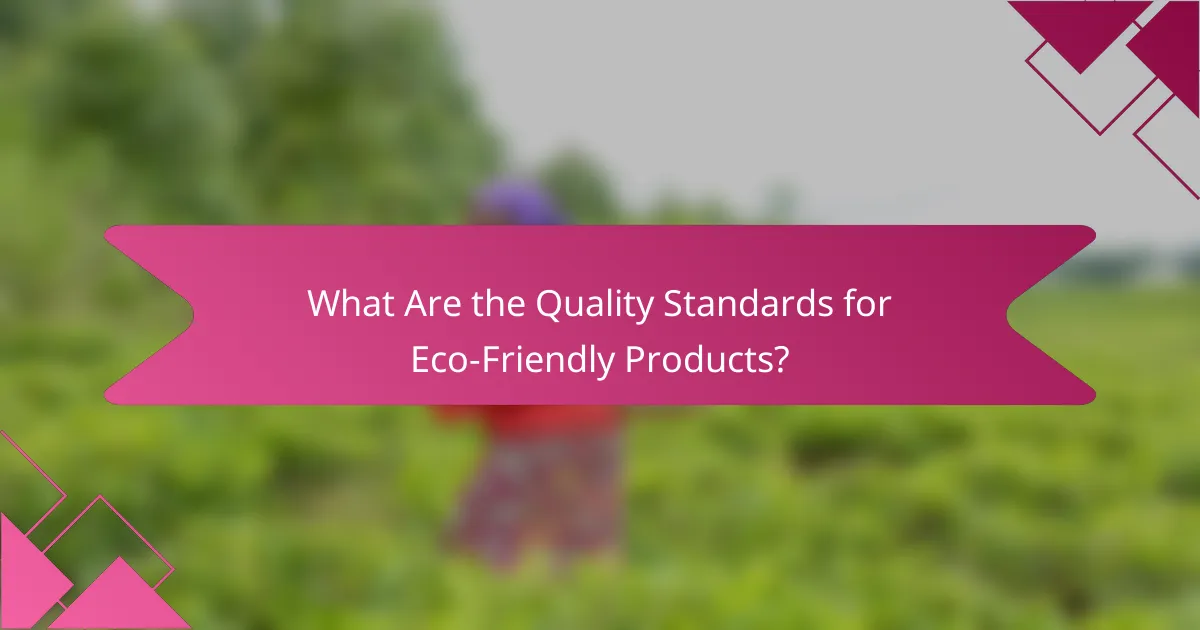
What Are the Quality Standards for Eco-Friendly Products?
Quality standards for eco-friendly products focus on sustainability, safety, and performance. These standards ensure that products are not only environmentally friendly but also reliable and effective for daily use.
Certification Labels
Certification labels indicate that a product meets specific environmental and safety standards. Common labels include Energy Star, USDA Organic, and Fair Trade, which help consumers identify trustworthy eco-friendly options. Look for these labels when shopping to ensure the product aligns with your sustainability values.
Material Sourcing Practices
Eco-friendly products often utilize sustainably sourced materials, such as organic cotton, bamboo, or recycled plastics. These materials reduce environmental impact and promote responsible consumption. When evaluating a product, check if the manufacturer provides information about their sourcing practices to ensure transparency and sustainability.
Durability and Longevity
Durability is a key quality standard for eco-friendly products, as longer-lasting items reduce waste and the need for frequent replacements. Look for products that offer warranties or guarantees, which often indicate a commitment to quality. Investing in durable eco-friendly items can save money in the long run and contribute to a more sustainable lifestyle.

How to Choose Eco-Friendly Products for Your Home?
Choosing eco-friendly products for your home involves evaluating their environmental impact, durability, and the transparency of the brands that produce them. Focus on items that minimize waste and support sustainable practices while ensuring they meet your quality standards.
Assessing Product Lifespan
When selecting eco-friendly products, consider their lifespan. Longer-lasting items reduce the need for frequent replacements, which in turn minimizes waste. Look for products made from durable materials that can withstand regular use.
For example, opting for stainless steel containers over plastic ones can provide a longer lifespan and better sustainability. Aim for products that offer warranties or guarantees, indicating confidence in their durability.
Evaluating Brand Transparency
Brand transparency is crucial when choosing eco-friendly products. Research companies that openly share their sourcing, manufacturing processes, and environmental impact. Brands that provide detailed information about their practices are often more trustworthy.
Look for brands that disclose their supply chain and use third-party certifications to validate their claims. Engaging with customer reviews and independent assessments can also offer insights into a brand’s commitment to sustainability.
Understanding Eco-Certifications
Eco-certifications help identify products that meet specific environmental standards. Familiarize yourself with recognized certifications such as Energy Star, USDA Organic, or Fair Trade, which indicate adherence to sustainability practices.
Check for labels that align with your values and the type of products you are purchasing. For instance, a product with the Forest Stewardship Council (FSC) label ensures responsible sourcing of wood materials. Always verify the credibility of the certification to ensure it reflects genuine eco-friendly practices.
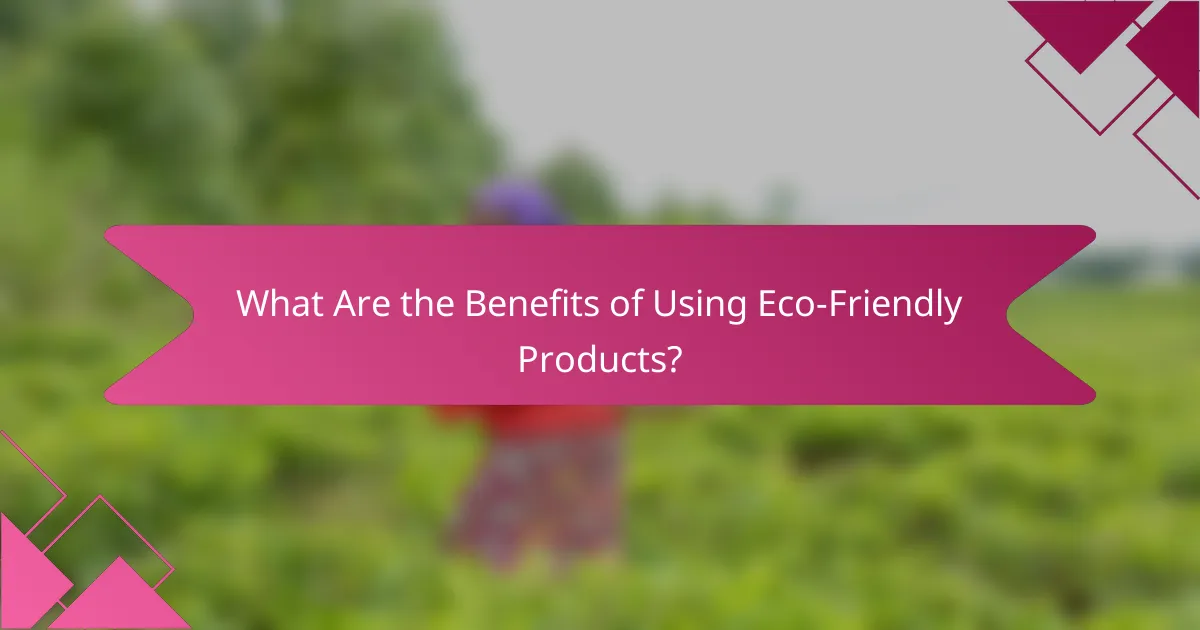
What Are the Benefits of Using Eco-Friendly Products?
Using eco-friendly products offers numerous advantages, including improved health, reduced environmental impact, and long-term cost savings. These benefits stem from the sustainable materials and practices used in their production, which promote a healthier lifestyle and a cleaner planet.
Health Benefits
Eco-friendly products are often made from natural ingredients, reducing exposure to harmful chemicals found in conventional items. This can lead to fewer allergies, respiratory issues, and skin irritations, contributing to overall better health.
For example, choosing organic cleaning supplies can minimize indoor air pollution, making your home safer for children and pets. Opting for biodegradable personal care products can also reduce the risk of skin reactions caused by synthetic additives.
Environmental Impact
The use of eco-friendly products significantly lowers pollution and conserves resources. Many of these items are designed to be biodegradable or recyclable, which helps reduce waste in landfills and oceans.
Additionally, sustainable manufacturing processes often consume less energy and water compared to traditional methods. For instance, products made from recycled materials can decrease the demand for virgin resources, further protecting ecosystems.
Cost Savings Over Time
While eco-friendly products may have a higher upfront cost, they can lead to substantial savings in the long run. Durable items often last longer than their conventional counterparts, reducing the need for frequent replacements.
Moreover, energy-efficient appliances can lower utility bills, and using reusable items, like cloth bags or water bottles, eliminates the ongoing expense of single-use products. Over time, these savings can add up significantly, making eco-friendly choices financially wise.
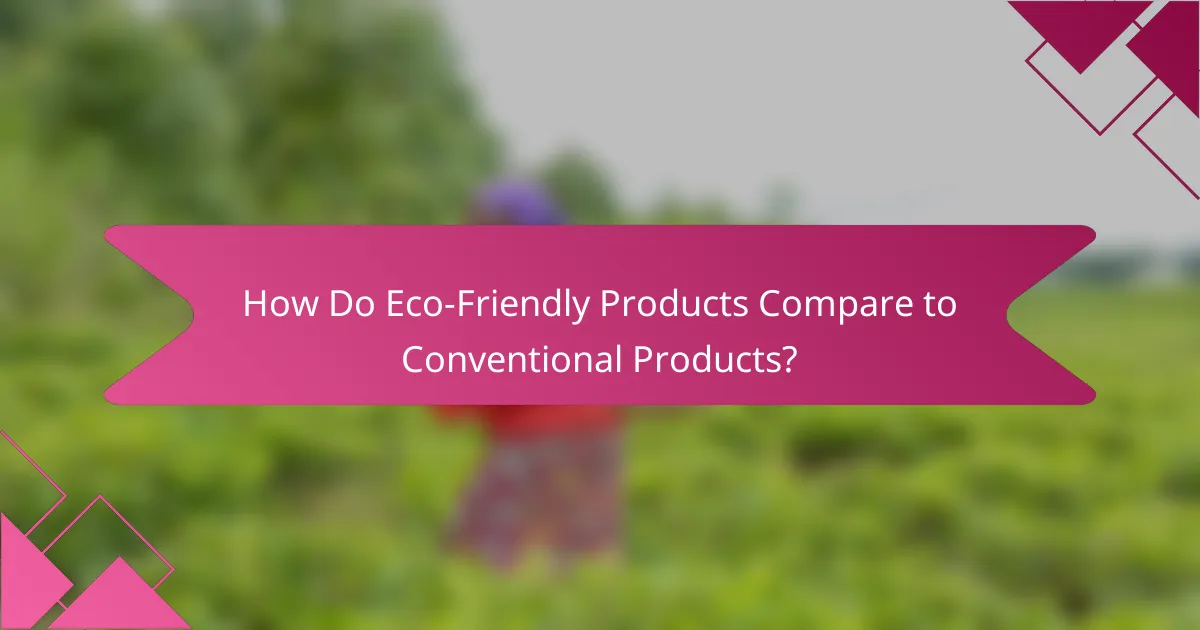
How Do Eco-Friendly Products Compare to Conventional Products?
Eco-friendly products generally prioritize sustainability and environmental impact over conventional alternatives. While they may sometimes have higher upfront costs, they often provide long-term benefits in terms of health, quality, and reduced ecological footprint.
Performance Metrics
When evaluating eco-friendly products against conventional ones, performance metrics such as durability, effectiveness, and user satisfaction are crucial. Many eco-friendly items are designed to meet or exceed the performance of traditional products while minimizing harm to the environment.
For instance, eco-friendly cleaning products often use plant-based ingredients that can be just as effective as chemical cleaners. However, some users may find that they require slightly more effort or time to achieve the same results, so it’s essential to read reviews and conduct tests to find the best options.
Additionally, consider certifications like Green Seal or EcoLogo, which indicate that a product meets specific environmental standards. These certifications can help consumers make informed choices about the performance and sustainability of the products they choose.
